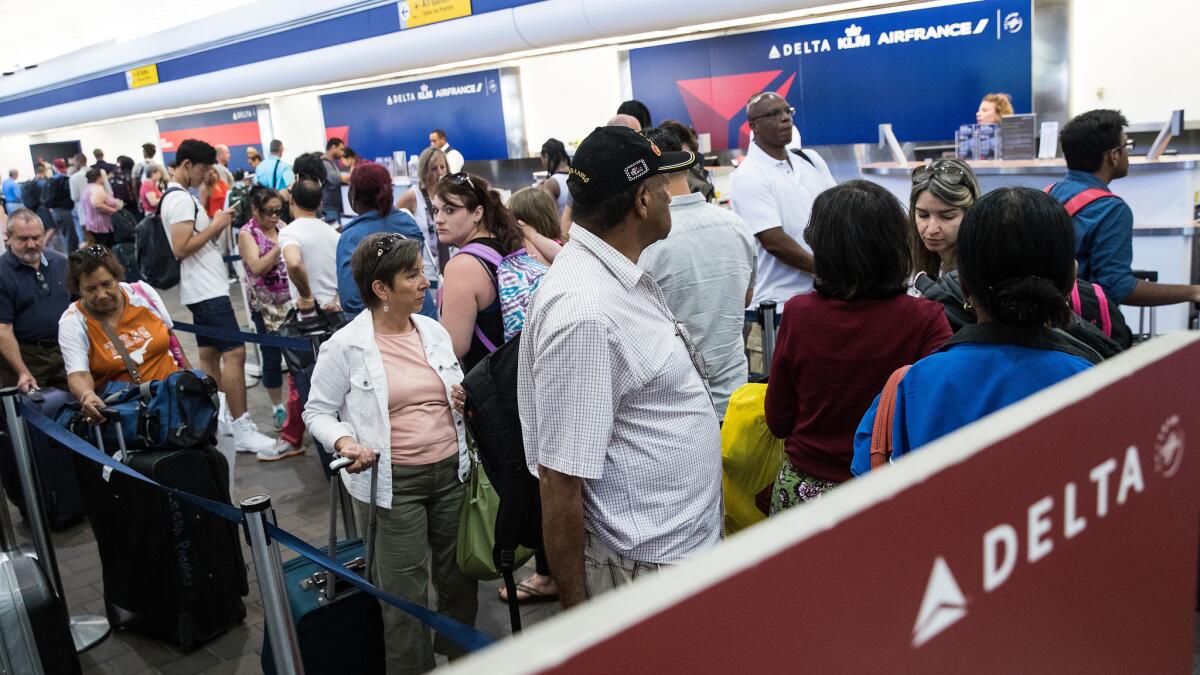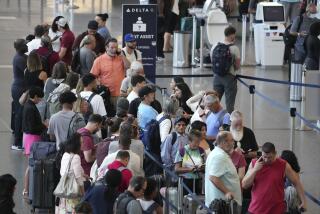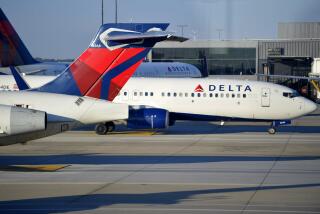Q&A: Why Delta’s outage caused such widespread headaches

Monday’s system-wide computer outage at Delta Air Lines continues to disrupt travel, with the cancellation of more than 2,100 flights and the delay of many more since the snafu began. Hundreds of thousands of passengers were stranded around the globe as the ripples spread out from Delta’s Atlanta headquarters.
The air carrier initially blamed the computer shutdown on a power outage by the Atlanta utility company but later said it was the result of an internal outage followed by the failure of a backup system to take over when the main computer system failed.
For the record:
5:00 p.m. Aug. 10, 2016A previous version of this story erroneously omitted the quotation marks that show the direct quotes of the experts in the story.
The airline had projected a return to normal operations by Wednesday afternoon, but delays and cancellations continued to mount.
“We’re in the final hours of bouncing back from the disruption,” Delta Senior Vice President Bill Lentsch said in an online update Wednesday.
Delta on Wednesday extended the period during which affected passengers can rearrange their travel plans without penalty and widened the pool to people with tickets for Tuesday and Wednesday flights. The company originally said rebooking and travel had to happen by Friday to avoid paying a change fee, but now customers have until Aug. 21. Delta also is offering refunds and $200 in travel vouchers to people whose flights were canceled or delayed at least three hours and is putting people up in hotels.
To find out what happened and why the effects were so widespread, The Times turned to industry experts Jan Brueckner, an economics professor at UC Irvine; Mark Gerchick, an author and former chief counsel at the Federal Aviation Administration; and Sam Kidd, an account manager at Zerto, a Boston-based data disaster recovery software company. Here are edited excerpts from those interviews.
Why was the impact of this computer shutdown so widespread?
Brueckner: Following a series of mergers over the past decade, 80% of all domestic travel is now controlled by four major carriers. They are, in order of passenger traffic, American Airlines, Southwest Airlines, Delta Air Lines and United Airlines. “When airlines get big, as current airlines are, when they have a problem it affects lots of people.”
Delta’s system was back online within a few hours. Why are we still seeing cancellations and delays days later?
Gerchick: To increase revenue and reduce costs, airlines fill planes to near capacity and try to schedule as many flights as possible with minimal turnaround time. “Capacity is being cut or not growing nearly as fast as demand. Load factors are high and there is much less flexibility in the system. You now have much more of a waterfall effect with each glitch.”
Have airline computer systems become too big and complicated?
Kidd: The computer systems used by airlines are not any more complicated than those used by other industries, such as banks. Airlines systems are just getting more scrutiny because a shutdown of an airline disrupts business trips and vacations and draws lots of media attention. “We can’t deny that the workload has gone up in the way airlines operate but it’s the same with finance companies and others. It’s just the nature of how we as a civilized society have evolved and adapted.”
Gerchick: An airline’s computer system is no longer just responsible for ticket bookings. It is also used for seat assignments, loyalty reward programs, targeting passengers for follow-up email and even selling vacations. And that is before you get into the ancillary sales. “I imagine the amount of information on these systems is greater than 20 years ago. I imagine the demands must be grand.”
Delta said it is still investigating why its backup system did not kick in when its main system failed. What can businesses like Delta do to reduce the likelihood of such catastrophes in the future?
Kidd: Airlines and other companies that handle a great deal of data must regularly invest in their software and hardware, and update and test it on a regular basis. At the same time, it’s more difficult and costly for a 24-hour operation like an airline to upgrade or test its computer system without interrupting regular operations. “The airlines I speak with are always investing in different things. Airlines are built on information technology. They know that every interaction with customers is done with IT.”
Are airlines investing enough in their computer systems or are they focused on buying new planes and building lounges — investments that might impress and draw in more high-paying customers?
Gerchick: It’s unclear how much is enough to invest in computer systems but airlines feel pressure to modernize their fleets because new planes give passengers the sense that airlines are more modern. Travelers rarely think about the investments needed for an airline’s computer system, until it fails. “Airlines are loath to spend on technology. People can tell if a fleet is old but they have no idea what’s going on in the back room. That is very different. They just assume the computer systems work. But you need to look at it through the prism of revenue. You are going to lose money if it screws up.”
Delta has had a reputation as one of the most punctual airlines in the industry. Will passengers forgive and forget this incident or will Delta feel long-term impacts?
Brueckner: “This kind of outage is a huge black eye for the airline. It’s like having a crash. You don’t want to do that.”
If a power outage could shut down the airline worldwide, what does this say about how vulnerable Delta’s system is to hackers or terrorists?
Kidd: The risk of a cyber attack cannot be totally eliminated, so airlines need to focus on recovering data quickly and getting systems back online as fast as possible. “All facilities have security. You can’t just walk up to these facilities. You can’t just stroll in there. The risk of an attack is pretty low. The bigger risk is how we deal with cyber crimes, people trying to hack into our systems. You can never say nothing will ever happen. We can just try to minimize the impact.”
To read more about the travel and tourism industries, follow @hugomartin on Twitter.
ALSO
Bay Area start-up Skully was a ‘sham,’ ex-employee says
Snapchat users fume over an Asian stereotype mask for selfies
Queen Mary is getting a bow to stern makeover — and a club in the boiler room
More to Read
Inside the business of entertainment
The Wide Shot brings you news, analysis and insights on everything from streaming wars to production — and what it all means for the future.
You may occasionally receive promotional content from the Los Angeles Times.











